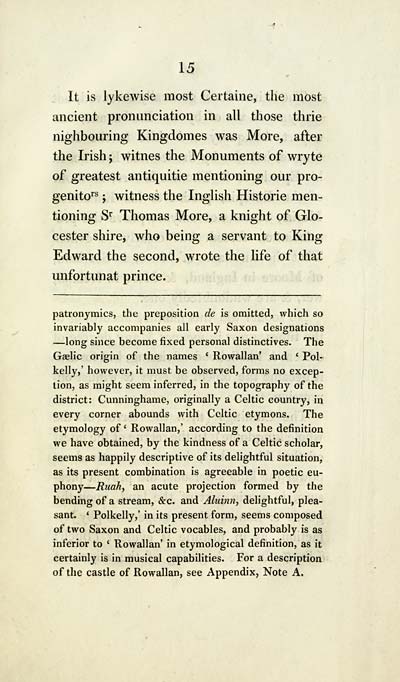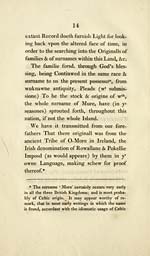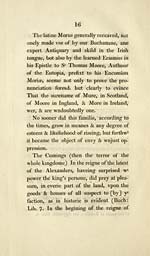Historie and descent of the House of Rowallane
(19) Page 15
Download files
Complete book:
Individual page:
Thumbnail gallery: Grid view | List view

15
It is lykewise most Certaine, the most
ancient pronunciation in all those thrie
nighbouring Kingdomes was More, after
the Irish ; witnes the Monuments of wryte
o£ greatest antiquitie mentioning our pro-
genito'"^ ; witness the Inglish Historic men-
tioning S^ Thomas More, a knight of Glo-
cester shire, who being a servant to King
Edward the second, wrote the life of that
unfortunat prince.
patronymics, the preposition de is omitted, which so
invariably accompanies all early Saxon designations
— long since become fixed personal distinctives. The
Gaelic origin of the names ' Rowallan' and * Pol-
kelly,' however, it must be observed, forms no excep-
tion, as might seem inferred, in the topography of the
district: Cunninghame, originally a Celtic country, in
every corner abounds with Celtic etymons. The
etymology of ' Rowallan,' according to the definition
we have obtained, by the kindness of a Celtic scholar,
seems as happily descriptive of its delightful situation,
as its present combination is agreeable in poetic eu-
phony — Ruah, an acute projection formed by the
bending of a stream, &c. and Aluinn, delightful, plea-
sant. ' Polkelly,' in its present form, seems composed
of two Saxon and Celtic vocables, and probably is as
inferior to ' Rowallan' in etymological definition, as it
certainly is in musical capabilities. For a description
of the castle of Rowallan, see Appendix, Note A.
It is lykewise most Certaine, the most
ancient pronunciation in all those thrie
nighbouring Kingdomes was More, after
the Irish ; witnes the Monuments of wryte
o£ greatest antiquitie mentioning our pro-
genito'"^ ; witness the Inglish Historic men-
tioning S^ Thomas More, a knight of Glo-
cester shire, who being a servant to King
Edward the second, wrote the life of that
unfortunat prince.
patronymics, the preposition de is omitted, which so
invariably accompanies all early Saxon designations
— long since become fixed personal distinctives. The
Gaelic origin of the names ' Rowallan' and * Pol-
kelly,' however, it must be observed, forms no excep-
tion, as might seem inferred, in the topography of the
district: Cunninghame, originally a Celtic country, in
every corner abounds with Celtic etymons. The
etymology of ' Rowallan,' according to the definition
we have obtained, by the kindness of a Celtic scholar,
seems as happily descriptive of its delightful situation,
as its present combination is agreeable in poetic eu-
phony — Ruah, an acute projection formed by the
bending of a stream, &c. and Aluinn, delightful, plea-
sant. ' Polkelly,' in its present form, seems composed
of two Saxon and Celtic vocables, and probably is as
inferior to ' Rowallan' in etymological definition, as it
certainly is in musical capabilities. For a description
of the castle of Rowallan, see Appendix, Note A.
Set display mode to:
![]() Universal Viewer |
Universal Viewer | ![]() Mirador |
Large image | Transcription
Mirador |
Large image | Transcription
Images and transcriptions on this page, including medium image downloads, may be used under the Creative Commons Attribution 4.0 International Licence unless otherwise stated. ![]()
| Histories of Scottish families > Historie and descent of the House of Rowallane > (19) Page 15 |
|---|
| Permanent URL | https://digital.nls.uk/95094934 |
|---|
| Description | A selection of almost 400 printed items relating to the history of Scottish families, mostly dating from the 19th and early 20th centuries. Includes memoirs, genealogies and clan histories, with a few produced by emigrant families. The earliest family history goes back to AD 916. |
|---|

